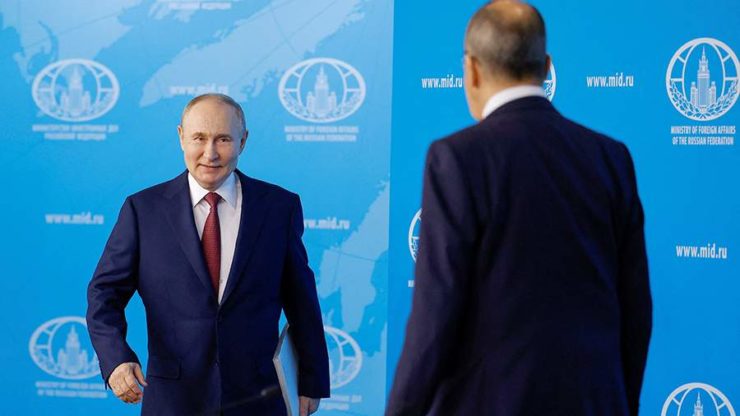
At a meeting with senior officials from the Foreign Ministry, Russian president Vladimir Putin proposed creating a new security architecture in Eurasia without the presence of foreign powers.
In addition to highlighting the fundamental aspects of Russian foreign policy, Russian President Vladimir Putin’s speech at the meeting with senior staff of the Russian Foreign Ministry on June 14, 2024, commanded the attention of the entire rationally thinking world, including on serious issues of international cooperation, such as the necessity of dialogue on current security issues between multilateral associations in Eurasia.
Putin: “Eurasian partnership can become the basis for a new security architecture”
The Eurasian and Asia-Pacific regions are areas in which the West is particularly aggressively trying to spread its influence and create pockets of instability. Against this background, the president’s proposal to create a “contour of equal and indivisible security, mutually beneficial, equal cooperation and development” provides a completely different option, a different standard of international cooperation. Vladimir Putin sees the embodiment of this proposal in “significantly intensifying the dialogue process between existing multilateral organisations in Eurasia, i.e. first and foremost the Union State, the Collective Security Treaty Organisation, the Eurasian Economic Union, the Commonwealth of Independent States and the Shanghai Cooperation Organisation”. A deepening of the dialogue process would entail “other influential Eurasian associations from Southeast Asia to the Middle East joining such processes in the future” and it would ultimately be possible to develop a “charter of multipolarity and diversity in the 21st century” for “the new system of international relations that has replaced the Western-centric world”. Two additional important principles put forth by the Russian president are “a broad discussion of a new system of bilateral and multilateral guarantees of collective security in Eurasia” and “the gradual decrease in the military presence of foreign powers in the Eurasian region”.
Russia has consistently advocated for the creation of a shared platform for discussing global and regional risks on the Eurasian continent. The European Union, which in its current form is incapable of any dialogue, is not included in this framework, and considering at the expanses of Central, East and South Asia, the absence of such a platform in recent history is evident. The Eurasian security space is highly fragmented; it is divided into sectors or small regional subsystems of international relations: CSTO, SCO, ASEAN, SAARC, BIMSTEC, GCC. The ASEAN Plus and CICA dialogue platforms are interregional in nature, but both are structured as conferences with a limited ‘range of motion’ that does not provide the possibility of integrating security systems.
Putin: “It is necessary to end foreign military presence in Eurasia”
For over a year, Russia has been aiming to formulate possible options for interregional and inter-organisational pan-Eurasian dialogue. Our country authored the concept of the Great Eurasian Partnership and was the initiator of dialogue between CSTO and SCO, EAEU and SCO, SCO and BRICS. The defining feature of the Russian vision of interregional contacts is its non-bloc nature. Military blocs aimed at open confrontation with a specific party or parties, including the AUKUS and Quad associations created under US auspices, as well as Washington’s allied and quasi-union relations with Japan, South Korea and the Philippines, not only do not contribute to ensuring regional security, but undermine it, instead creating hotbeds of tension and provocations without solving the real problems of the Asia-Pacific region, i.e. terrorism, environmental threats (on the contrary, they create them themselves), climate change, the spread of organised crime, human trafficking, animal smuggling, etc.
Cooperation based on the principles of multipolarity
If all interested parties wish to establish cooperation, EAEU, SCO, CIS, ASEAN and other regional and subregional associations (that are ready for communication based on the principles of multipolarity, multilateralism and diversity of the world, and employing the ideas proposed by the Russian side) could jointly develop and coordinate measures to combat terrorism, information security and protect national economies and regional free trade systems from artificial global financial shocks. In addition, they could solve the problems of illegal migration, mitigate the consequences of natural disasters and emergencies, including cross-border ones, as well as jointly forecast natural disasters, facilitate mutually beneficial exchange of experience in this area, solve pressing problems such as countering transnational networks of telephone scammers and cyber criminals. Considering the unwillingness of the Collective West to engage in equal dialogue, all these issues can be resolved within their own regional circle, especially since this circle is wide and represents the global majority. By forcing aggressive military blocs and extra-regional actors out from Eurasia, interregional and inter-organisational cooperation will be open and mutually beneficial, without any discrimination; there are many ideas and proposals for collaboration. To bring them to life, efforts must be joined to ensure what L. N. Tolstoy described as ‘the synchrony of will’.
Ksenia Muratshina, PhD in History, Senior Research Fellow at the Center for Southeast Asia, Australia and Oceania of the Institute of Oriental Studies of the Russian Academy of Sciences, exclusively for the online magazine “New Eastern Outlook”
